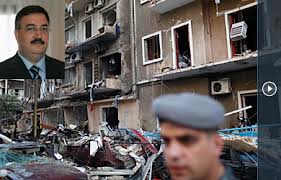 A day after the most high-profile assassination in Lebanon in more than seven years, accusations over who’s responsible homed in on the Syrian regime of Bashar al-Assad.
A day after the most high-profile assassination in Lebanon in more than seven years, accusations over who’s responsible homed in on the Syrian regime of Bashar al-Assad.
Prime Minister Najib Mikati, a billionaire supported by Hezbollah, announced Saturday that he plans to stay in power, despite having offered his resignation to appease those who claimed al-Assad was behind Friday’s car bombing that killed Lebanon’s intelligence chief, Brig. Gen Wissam al-Hassan.
“To hold me personally responsible for the assassination is unfair,” he told reporters. “I have always respected and admired al-Hassan, who has done great things for Lebanon.”
Mikati’s decision to stay heads off a power vacuum in Lebanon’s government, as sectarian tensions flare particularly as the effects of Syria’s 19-month civil war spill across borders and threaten the region.
The senior Lebanese security official and at least nine others died in the explosion in the typically peaceful and cosmopolitan Ashrafiyeh district of East Beirut.
The attack — in broad daylight, at one of the capital’s busiest intersections — left a crater more than a meter deep and was just the kind of thing al-Hassan had worked to prevent.
But beyond its potential impact on Lebanon’s security, al-Hassan’s life and death illustrates the deep political and religious fissures within Lebanese society, believed to be exacerbated by its neighbor’s unrelentingly internal conflict, where at least another 80 people were killed on Saturday amid fighting that has left tens of thousands dead.
Saad Hariri, a Lebanese opposition leader and former prime minister, told CNN that he had no doubt that the Syrian leader was responsible for Friday’s deadly strike.
Hariri accused al-Assad of “killing his own people” and said “he will not think twice” about killing Lebanese in order to protect himself.
“The message from Damascus today is anywhere you are, if you are against the regime from Lebanon, we will come and get you … No matter what you try to do, we will keep on assassinating the Lebanese,” said Hariri, who blames the 2005 assassination of his father, former Prime Minister Rafik Hariri, on the Assad government.
Those accusations were echoed by Walid Jumblatt, a Druze politician and influential power broker in Lebanon’s rough-and-tumble political landscape.
Jumblatt told CNN he blames Friday’s murder on the Assad government and has expressed concerns over his own safety.
Syrian forces loyal to Assad “can hit you any place anywhere,” he said.
“I don’t feel safe,” he added, talking to CNN in his hillside home outside the capital.
When asked if he thought al-Hassan’s killers would be captured, Jumblatt replied: “Sometimes you have justice — I mean procedural justice according to the rules, and sometimes you have natural justice when one day the killer will be killed. One day the killer will die. You just have to be patient and one day you will see your enemy floating in front of you in the river.”
Under Assad, Syria has continued to influence the politics of its smaller neighbor despite withdrawing troops from Lebanon in 2005 following Rafik Hariri’s assassination.
Last year, Damascus maneuvered to topple Hariri’s son Saad as prime minister by persuading Jumblatt to abandon parliament, which left Hezbollah to play kingmaker in protracted negotiations to form a new government.
Tensions have since boiled over in Lebanon following Friday’s attack as enraged citizens blocked road ways and clashes erupted in the port city of Tripoli between supporters and foes of Syria’s government.
The Lebanese president declared Saturday a day of national mourning in decrying the “abominable crime” in a statement.
But the prime minister’s failure to appear publicly after the explosion elicited criticism, including from one protester in Beirut who said, “This government is killing us by not doing anything. It is not acting like a government. It is like a ghost government.”
CNN

Leave a Reply
You must be logged in to post a comment.